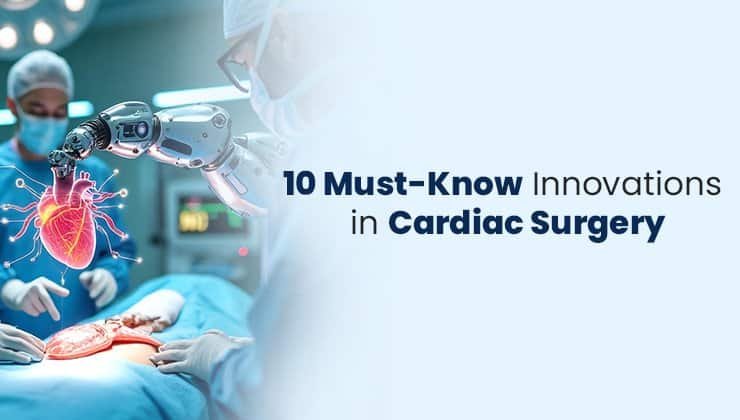Cardiovascular diseases continue to be a health challenge worldwide. With advancements in medical technology, cardiac surgery has seen groundbreaking innovations that help surgeons treat complex heart conditions. From minimally invasive procedures to artificial intelligence in surgical planning, these innovations make cardiac surgeries safer, effective, and personalised.
In this article, let us explore ten of the latest innovations in cardiac surgery that are improving patient outcomes!
Understanding Cardiac Surgery
Cardiac surgery involves surgical interventions that are done to treat different heart-related conditions, including coronary artery disease, heart valve defects, congenital abnormalities, and heart failure.
Traditionally, these procedures require open-heart surgery with a large incision, extended recovery times and longer hospital stays.
However, recent advancements in cardiac surgery allow cardiac surgeons to perform complex surgeries with precision and accuracy, resulting in quicker recovery, less bleeding, and minimal scarring.
Innovations In Cardiac Surgery
Here are some of the innovations in cardiac surgery:
1. Robotic-Assisted Heart Surgery
Robotic-assisted heart surgery is a significant innovation in cardiac surgery, transforming the field of heart care. This technique allows surgeons to use tiny instruments and robot-controlled tools to perform cardiac surgery through small incisions in the chest. The robotic system gives a magnified view of the heart.
Robotic-assisted heart surgery has been utilised for various heart-related procedures, including valve surgery or replacement, coronary artery bypass surgery, cardiac tissue ablation, heart defect repair, and the removal of cardiac tumours.
Patients may benefit from less trauma, reduced blood loss, and faster recovery.
2. Transcatheter Aortic Valve Replacement
Another innovation in the field of cardiac surgery is the transcatheter aortic valve replacement (TAVR) that has helped patients diagnosed with aortic stenosis. TAVR is a minimally invasive procedure that is used for people who can’t have heart surgery to replace the aortic valve.
It involves aortic valve replacement through a catheter inserted via the groin, eliminating the need for open-heart surgery.
It offers shorter hospital stays, faster recovery, and improved quality of life in patients.
3. Coronary Artery Bypass Grafting (CABG)
Coronary artery bypass grafting (CABG) has significantly evolved from the traditional open-chest approach to safer, less invasive techniques.
Minimally invasive CABG has made CABG less invasive compared to traditional procedures, speeding up the recovery and minimising the pain.
Off-pump CABG does not use a heart-lung bypass machine, and the surgeon performs the procedure while the heart is still beating, reducing trauma, blood loss, and infection.
Robotic-assisted CABG enhances the surgical precision through 3D visualisation.
These advancements in CABG deliver longer-lasting outcomes, fewer complications, shorter hospital stays, and faster return to daily life.
4. Bioengineered Heart Valves
Traditional mechanical and bioprosthetic valves often require lifelong medication and replacement. Bioengineered heart valves are made from a patient’s own cells and combine scaffold-based engineering and advanced biomaterials.
By reducing the risk of rejection and eliminating the need for blood thinners, these valves offer a more sustainable solution for the valve replacement procedure. However, more clinical studies are required in future to evaluate the bioengineered heart valves.
5. Hybrid Cardiac Surgery
Hybrid cardiac surgery is a procedure that combines conventional invasive open-heart surgery with an interventional catheter-based procedure in a hybrid operating room with state-of-the-art imaging and surgical equipment.
It reduces the risk of surgical complications, shortens recovery time, and minimises trauma, especially in high-risk patients and re-operative patients.
It provides an individualised treatment plan, improving patient safety and effectiveness.
6. Stem Cell Therapy For Heart Regeneration
Stem cell therapy represents a major innovation in cardiac treatment, moving beyond symptom management to tissue repair.
Research is being conducted to repair damaged heart muscle using stem cells obtained from bone marrow and inserted through a catheter. Once inside the heart, it may help regenerate damaged heart tissue.
Larger trials are needed to study the role of stem cell therapy for treating heart disease, as its long-term effects are still a concern.
7. ECMO (Extracorporeal Membrane Oxygenation)
Extracorporeal Membrane Oxygenation, ECMO, is a critical support technology during and after cardiac surgery to stabilise patients with life-threatening heart failure.
It takes over the heart and lung functions when the heart can’t sustain adequate circulation during postoperative complications. It reduces intraoperative risk and improves survival in complex cases.
Portable EMOs are available now that enable greater mobility and better patient outcomes.
8. 3D Printing And Advanced Imaging For Surgical Planning
The advent of 3D printing technology in cardiovascular surgery has enabled the creation of patient-specific heart models before undertaking complicated heart surgery. It combines imaging, including CT and MRI, with dedicated 3D printing software and hardware.
It helps in planning the surgery, anticipating difficulties, and rehearsing the procedure in advance. It further enhances the patients’ understanding of their diseases.
However, it has limitations due to a lack of evidence demonstrating effectiveness and high costs. Despite its current limitation, it holds promise for the future.
9. Role Of AI in Heart Surgery
Artificial intelligence (AI) is transforming heart surgery across the patient journey from planning to aftercare. It enhances preoperative planning by creating detailed 3D replicas of a patient’s heart, allowing surgeons to simulate procedures and postoperative care.
It has also become an important tool for assisting surgeons in real-time decision-making during surgery and predicting patient outcomes.
Also, AI-enhanced wearable monitoring enables early detection of issues, including arrhythmias. Together, these innovations help in developing safer, more personalised, and data-driven cardiac care.
10. Gene Therapy For Heart Surgery
Gene therapy offers a promising treatment by delivering healthy genes into the body to silence the faulty genes responsible for heart conditions.
It also helps regenerate heart tissue and improve heart function. Preliminary studies have shown the delivery of genes in heart failure patients, showing improved heart function and fewer hospitalisations.
However, the studies are still experimental and ongoing research is exploring its potential for treating heart failure, ischemic heart disease, and other cardiovascular diseases without surgery. More research studies are required in future to determine the role of gene therapy for heart surgery.
Conclusion
The field of cardiac surgery is undergoing many advancements due to various innovations, including bioengineered tissues, AI-driven planning, and 3D printing. These innovations are making cardiac procedures less invasive, more precise, and more personalised, improving patient safety, outcomes, and recovery.
Heart360 Care in Chennai, under the leadership of Dr Nihkil P.J. Theckumparampil, an American Board-certified cardiac surgeon, offers a range of cutting-edge cardiac innovations, including robotic-assisted cardiac surgery, TAVR/TAVI, minimally invasive and off-pump CABG, and comprehensive hybrid procedures. It is recommended to consult with Heart360 Care to determine the best treatment options based on the individual condition and risk factors.
Frequently Asked Questions
The latest innovations, including bioengineered heart valves, 4D holographic planning, AI-driven intraoperative guidance, and hybrid ORs, are making cardiac surgery safer, efficient, and highly personalised. The future of cardiac surgeries promises less trauma, less invasive procedures, with better long-term outcomes.
Robotic-assisted cardiac surgery offers many advantages, including less trauma, scarring, and shorter hospital stays. It makes an excellent alternative in suitable cases. However, in complex cases, open-heart surgery remains essential. So, robotic-assisted cardiac surgery can not completely replace open-heart surgery.
The eligibility for the advancements in cardiac surgery may vary depending on overall health, type, and severity of heart disease, and previous medical history. It is recommended to consult your healthcare professional to check if you are suitable for these innovative techniques.The eligibility for the advancements in cardiac surgery may vary depending on overall health, type, and severity of heart disease, and previous medical history. It is recommended to consult your healthcare professional to check if you are suitable for these innovative techniques.
Hybrid cardiac procedure represents a safe, patient-friendly, and effective alternative to conventional cardiac procedure, especially if performed by experienced professionals in selected patients. Also, it results in shorter hospital stays and faster discharge, enabling quicker return to daily activities.









